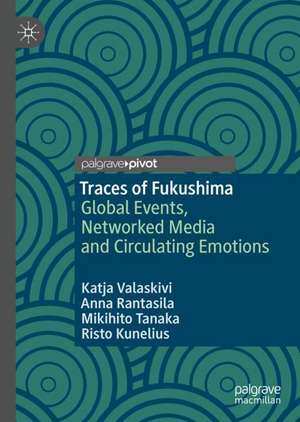Traces of Fukushima: Global Events, Networked Media and Circulating Emotions
Autor Katja Valaskivi, Anna Rantasila, Mikihito Tanaka, Risto Kuneliusen Limba Engleză Hardback – 26 apr 2019
This book explores the mediated aftermath and remembrance of the 2011 Fukushima Daiichi nuclear disaster through three crucibles: time, space and emotion. Through an ambitious and innovative combination of theoretical and methodological approaches, the book discusses how meanings, emotions and interpretations of disruptive events such as the Fukushima Daiichi disaster circulate and change over time and space in the global, contemporary hybrid media environment. Through its six multi-method empirical case studies from Japanese local newspapers to commemorative Tweets, the volume addresses questions of memory, trauma, expertise and nuclear politics in relation to the three key concepts of the book. The findings of this book provide new insights on research of disruptive media events in the contemporary hybrid media environment.
Preț: 418.83 lei
Nou
Puncte Express: 628
Preț estimativ în valută:
80.14€ • 83.89$ • 66.70£
80.14€ • 83.89$ • 66.70£
Carte tipărită la comandă
Livrare economică 31 martie-14 aprilie
Preluare comenzi: 021 569.72.76
Specificații
ISBN-13: 9789811368639
ISBN-10: 9811368635
Pagini: 148
Ilustrații: XVI, 156 p. 11 illus.
Dimensiuni: 148 x 210 mm
Greutate: 0.36 kg
Ediția:1st ed. 2019
Editura: Springer Nature Singapore
Colecția Palgrave Pivot
Locul publicării:Singapore, Singapore
ISBN-10: 9811368635
Pagini: 148
Ilustrații: XVI, 156 p. 11 illus.
Dimensiuni: 148 x 210 mm
Greutate: 0.36 kg
Ediția:1st ed. 2019
Editura: Springer Nature Singapore
Colecția Palgrave Pivot
Locul publicării:Singapore, Singapore
Cuprins
Introduction: Tracing the Meanings of Fukushima.- Part I - Time.- Dealing with the Disaster – The Live Media Event.- Temporal Affordances in the Networked Remembering of Fukushima.- Part II – Space.- Towards a Geography of Mediated Affect: Discursive Spaces and Emotional Dynamics.- Social Media and Ambient Social Distance.- Part III –Emotion.- The Global Circulation of Affect – The Case of Iodide Tablets.- Affective Entanglements of Expertise – The Finnish Case.- Conclusion: Time, Space and Emotion in Tracing Fukushima.
Notă biografică
Katja Valaskivi is Research Director for the Tampere Research Centre for Journalism, Media and Communication (COMET) at Tampere University, Finland.
Anna Rantasila is a doctoral student of media studies at Faculty of Information Technology and Communication Sciences, Tampere University, Finland.
Mikihito Tanaka is Associate Professor for the Journalism School, Graduate School of Political Science at Waseda University, Japan.
Risto Kunelius is Professor of Journalism at Tampere University, Finland.
Anna Rantasila is a doctoral student of media studies at Faculty of Information Technology and Communication Sciences, Tampere University, Finland.
Mikihito Tanaka is Associate Professor for the Journalism School, Graduate School of Political Science at Waseda University, Japan.
Risto Kunelius is Professor of Journalism at Tampere University, Finland.
Textul de pe ultima copertă
This book explores the mediated aftermath and remembrance of the 2011 Fukushima Daiichi nuclear disaster through three crucibles: time, space and emotion. Through an ambitious and innovative combination of theoretical and methodological approaches, the book discusses how meanings, emotions and interpretations of disruptive events such as the Fukushima Daiichi disaster circulate and change over time and space in the global, contemporary hybrid media environment. Through its six multi-method empirical case studies from Japanese local newspapers to commemorative Tweets, the volume addresses questions of memory, trauma, expertise and nuclear politics in relation to the three key concepts of the book. The findings of this book provide new insights on research of disruptive media events in the contemporary hybrid media environment.
Caracteristici
Examines global media events and the increased inter-dependency of nations and political actors. Highlights the complexity and transnational risks from unscheduled disasters to orchestrated summits Considers how global communication infrastructure has been revolutionized by digitalization
